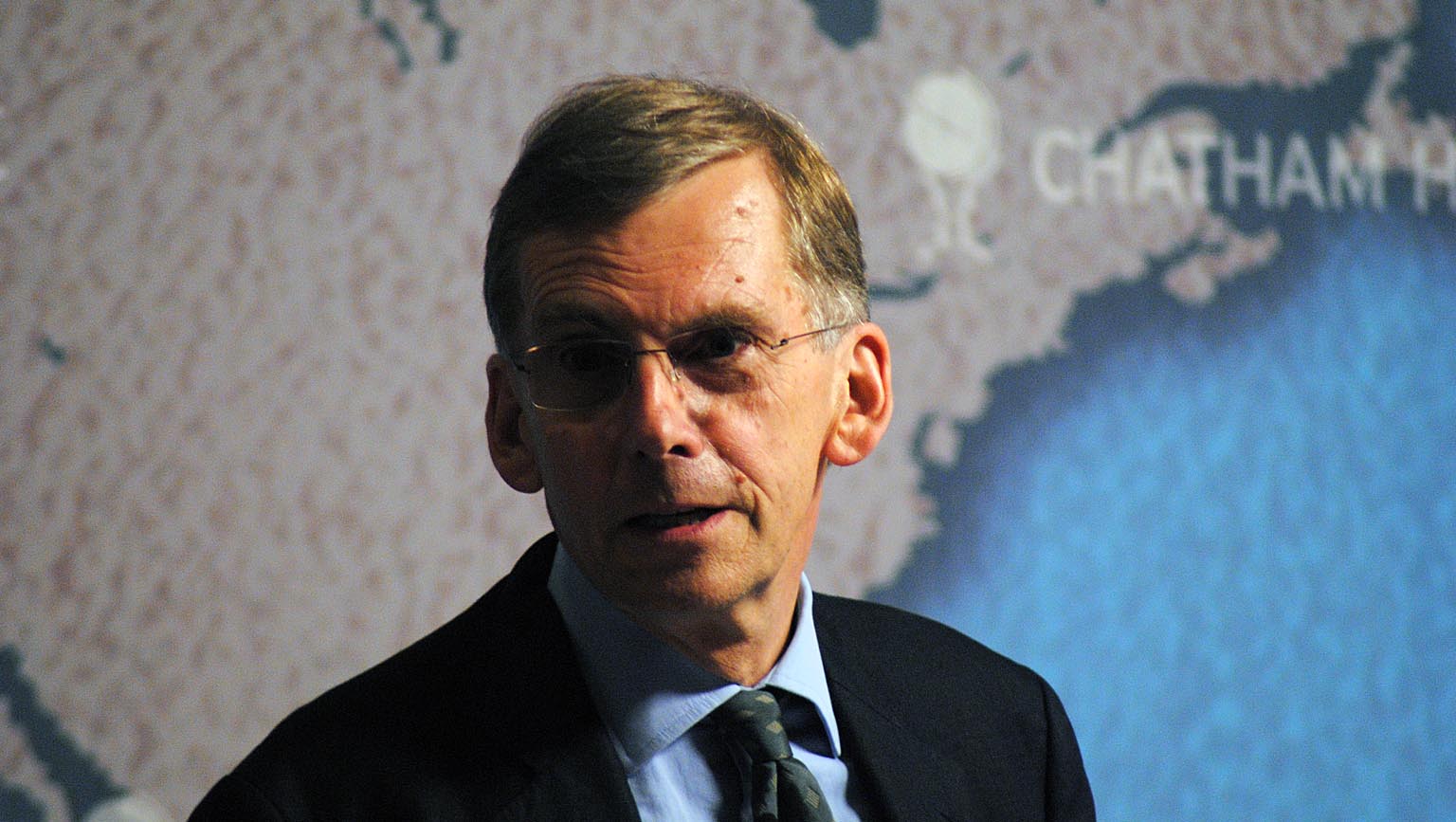
The Basement Gym + Studio opens in Camden Town
Camdenist readers get 50% off their first month’s membership, too

A Tufnel Park resident for over 40 years, Sir David Ormand is a heavyweight of UK defence and intelligence. He was Director of security service GCHQ before working at the heart of government, including being the one to inform then PM Margret Thatcher on the imminent Argentine invasion of the Falkland Islands. Ahead of his appearance at HowTheLightGetsIn up at Kenwood this month, we spoke to him about the conflict in Ukraine, the tensions between the USA and China, the threats and promise of AI technologies and our need to be better prepare for future crises.
Your panel at HowTheLightGetsIn is titled ‘In Pursuit of Peace’. Where do you feel the world is today in terms of achieving this goal?
I’ll be on a panel alongside Ukrainian politician Inna Sovsun and economist and professor Richard Wolff with philosopher Hilary Lawson as the host, so it should be a good debate from very different points of view. I spent my career in defence, security and intelligence, and today I’m at King’s College in the War Studies department. I put the emphasis on war studies rather than peace studies, so I’ll be approaching the debate from that particular perspective.
I’d say the ultimate aim is peace with freedom, in other words not the absence of war at any price, which might have been the case if we’d taken a different course in 1940. Still, from that perspective we’re not in a very good place at the moment. We were all horrified by the Russian invasion of Ukraine, and the realisation that we’ve got a major war going on in Europe now, with no sign of either party inflicting a decisive defeat on the other, or of giving up the will to fight. So that is a very grim prospect, and we’ve also got growing tension between the United States and China which may or may not eventually lead to conflict. I’m reasonably optimistic about that myself, but it is entirely possible to take a very different view. It’s clear that United States is going to try and maintain its position in the world while President Xi Jinping is clearly determined to try and alter that position. I’ve also got concerns about the potential for other conflicts in the longer term. I mean, the planet is warming, so we’re likely to have some vicious conflicts over resources like water and food, meaning the next 20 or 30 years could be quite rocky.
What kinds of additional risks – and opportunities – do you feel emerging AI technologies will bring to this complex landscape?
Well, the driver here is not the technology itself, but the human motivations on how to use it. One of the points I certainly want to make in the debate at Kenwood is that when you think about prospects for peace in Ukraine, you’ve really got to understand the motivations of the parties involved, particularly President Putin. His approach is almost one of Stalinist imperialism, so whilst that continues, the prospects for peace in the long term are neither here nor there.
AI technology brings plusses and minuses. Thinking about the risks that our armed forces take, if you can conduct UK air defence missions without risking a pilot – something that will come in due course – there’s almost a moral duty to adopt the technology. Ukrainians have already been using a combination of intelligence and smart drones in order to hold the Russians at bay. But the potential for states to develop autonomous weapons systems where the AI algorithms have decided engaged targets without human intervention, that I find scary.
I’d have been in favour of trying to reach an international agreement on fully autonomous weapons systems. It may happen one day, but you need the right motivations on the part of world leaders and the moment, the incentives tend to be the opposite. But what AI will change very much is the management of information, and you can say that future conflicts will be determined more by information than by sheer military hardware on the ground. The one thing we can be certain of is that AI is going to turn up some very surprising ways of changing our lives.
What are your thoughts on how we should navigate the battle for truth in this era of deepfakes and the weaponizing information?
When I wrote my book, How Spies Think, a couple of years ago, one of the themes was that we’ve got to get back to some old fashioned rationality. We particularly need to teach our children how to be aware that not all information they’re going to receive – and in future we are going to get even more information – is genuine, and based on a proper assessment of the facts, and that it may even be deliberately deceptive. So we’ve got to get much smarter in the way we interact with this technology.
So is media literacy something that should be taught on the National Curriculum?
Absolutely, yes. I’m very much in favour of deliberately teaching not only the safe use of information technology, but the basics of reasoning. The old tradition was that kids will pick that up naturally because you’re teaching them history and science, but nowadays that’s not good enough. I’m not saying that we should live in a completely rational world absent of emotion. A good decision fuses two very different kinds of thought; the emotional and the rational. If you’ve got too much of the emotion you end up with the’ boosterism’ that Johnson and Truss fell into, but if you’re just rational then why would anybody follow you? Why would you have any political leadership if you haven’t got a bit of a vision? So it’s bringing those two together. I think President Zelensky has done a fantastic job of that, because he’s inspired his country to resist the Russians, yet at the same time, he’s been really realistic about what it’s going to take on the battlefield to do that. There’s no boosterism there, but you do get this convincing message. I think Churchill in 1940 did exactly the same. He inspired the nation to resist but at the same time really took care to make sure that the spitfires got produced.
You new book is How to Survive a Crisis – has the Covid response revealed we’re not very good at it?
I think what it revealed is that we can very easily lose the plot, because we knew all about infectious diseases. We had plenty of lessons from the SARS experience, particularly overseas, but somehow never quite connected it with getting ourselves properly prepared and having enough protective equipment. We were saved from what would have been a true disaster by the rapid development of vaccines, and that was an instance where prior investment by governments and companies in vaccine technology worked.
I draw a distinction in the book between emergencies, crises and disasters. We have emergencies all the time. Stuff happens and the emergency services rush in and we get over it. But if it we’re caught unprepared, events hit us with an intensity and rapidity that our normal systems can’t cope with. Then you’re in crisis. If we’ve invested in resilience, you can turn the crisis back into an emergency, but if you haven’t done that preparation and thought ahead, then we slide into disaster, which just goes on and on. So as with Covid, we shut the schools so we produce an education crisis, a prolonged lockdown sees businesses close and we have an employment crisis, and bit by bit you slide downhill. The message is, for goodness sake, make sensible precautions to make sure we can manage that difficult periods when things are out of control.
Which problems of the future do you think we’re not really prepared for?
About half my book as about watching out for what I call ‘slow burn crises’. These are the hardest to deal with, because the problems is getting worse and worse year on year, but either we haven’t noticed, or more often we haven’t determined to do anything about it. This week’s news about the failing concrete in schools is a classic example. We had 30 years’ notice that the roofs of those schools would start to become unsafe, yet resources were never made available – suddenly, we’re in the midst of a crisis. It’s the same with cloaking high rise buildings in non-fire resistant cladding. The risk are known, yet we continue doing it until tragically you have Grenfell, and then suddenly millions of pounds worth of costs have to be found. You could even take the example of doctors pay. For 12 years you have pay rises that don’t cover the cost of living, so the gap gets wider, and then you simply can’t afford to solve it all at once. An then of course there are numerous examples around how we approach climate change.
From a national intelligence perspective, should we include our lack of preparedness for the actions of Putin as another example of a slow burn crisis suddenly blowing up on us?
Yes. The first alarm bells were ringing over Georgia, then the annexation of Crimea and the Eastern Donbass and deploying those parts of Russia in 2014. The reaction from the West was pretty muted. So in terms of a deterrent signal, it was pretty weak. My hunch is that stage we didn’t properly appreciate President Putin’s worldview. The fact that he’s openly written about the historical unity of Russians and Ukrainians, he called it a ‘common spiritual and moral space’ occupied by Russia, Ukraine, and Belarus. So if you have that kind of worldview, Ukraine has no right to an identity outside of the Russian Empire, and you have Putin recalling the glory days of Tsar Peter the First and Tsar Alexander, who was not only Emperor of Russia, he was King of Poland and Grand Duke of Finland! If that’s being held up to us, as it was quite openly in his historical writing and speeches, then we should have been saying to ourselves that this is one of those slow burn crises and at some point, he may well be tempted to invade. So we should have been sending out much more robust messages about the integrity of Ukraine, certainly after 2014.
Overall, how optimistic are you about the global picture?
Well, that splendid 1920 revolutionary quote by Gramsci, ‘pessimism of the intellect, optimism of the will’ probably sums it up. You have to be a bit pessimistic on the facts of the matter when you look around the world, but you mustn’t ever give up the optimism, and at heart I think I’m an optimist.Sir
David Ormand is a panelist at HowTheLightGetsIn , the world’s largest philosophy and music festival, which returns to London this 23-24 September.
Renowned as a hub for world-leading thinkers, Mercury-prize winning musicians and cutting-edge comedians, this year’s festival theme is ‘Dangers, Desire, and Destiny’. Expect to see Ruby Wax, Alastair Campbell, Rory Stewart, Deborah
Frances-White, David Baddiel, Michio Kaku and more lock horns over a packed weekend of debates, talks and performances. Explore the full line-up here.
As partners of the festival, we’re thrilled to offer 20% off full festival tickets with code CAM23. Get your discounted tickets here.

Camdenist readers get 50% off their first month’s membership, too

A brand new hairdressing and barbering academy has landed in Camden Town and is now seeking style-conscious models and enthusiastic trainees

We speak to founder, Sol, about bringing the studio to Kentish Town

Explore the neighbourhood’s brand new neighbourhood